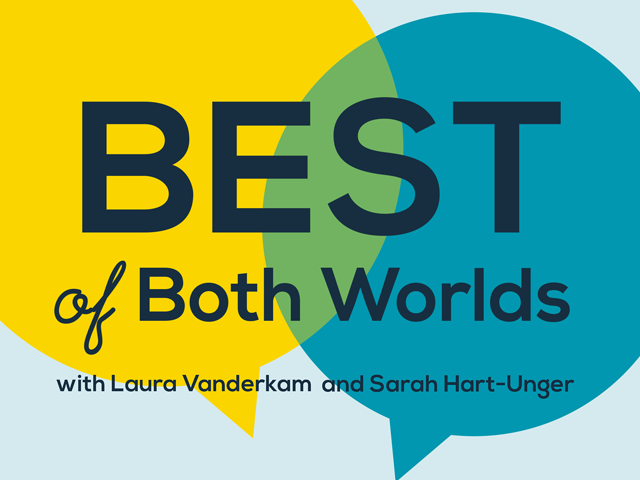There’s a saying out there that “you can’t be what you can’t see.” While that’s not entirely true (someone has to be first!) it is true that a lack of role models can make any life choice feel more fraught.
That wasn’t the case for Christy Higgins Wilcox. Her mother, Karen Higgins, was a pioneering physician: one of few women in her medical school class in the 1970s, and then in her town to raise three children (as a mom) while building a practice. Two of Wilcox’s siblings went into medicine; Wilcox became a lawyer and is now the head of HR for a bank. The two joined Sarah and me as guests on Best of Both Worlds this week to talk about their lives. It was a fascinating interview about their family dynamics.
Then in the Q&A we tackle a question from a listener who wants to know how to handle the post-nap time slot when it’s dark and cold. Young children often nap from, say, 1-3 p.m., or even to 3:30 p.m. Staying home until dinner after the nap can be an invitation to misery, but getting out the door to an activity can be challenging when the indoor things (like children’s museums) often close by 5 p.m. We have a few ideas, and sing the praises of places that stay open until 6.
Please give the episode a listen, and then rate/review us on Apple podcasts. And please tell a friend about us too! We’re looking to grow our audience in 2020.


Minority women have worked outside the home for generations, so the basic premise of this episode strikes me as incredibly tone deaf. To be clear, this comment is directed at how you and Sarah framed the episode, not at your guests. All of the comments on it not being normal for women to work outside the home during that time only applied to certain segments of the population and an acknowledgment of that was warranted. Just an FYI, all of your listeners aren’t descendant from a long line of white, upper-class families, and maybe sometimes you should think about that when you plan your guests and the conversations you have with them.
Wow, that is quite a judgy comment! Is someone holding you at gunpoint and forcing you to listen to the podcast?
For the record the response below was another Sarah; this is SHU of the podcast. That’s a fair point and a perspective I didn’t think of as we framed the intro. The intro in no way was meant to be culturally exclusionary, but I see how it could come off that way. Personally, I was just inspired by Dr Higgins’ ambition and drive in an age where it was not the norm and you’re right, that’s mostly within her own demographic.
(I guess it’s actually a response above not below 🙂 )
This was a fun podcast to listen to for me because it reminded me so much of my own mom and our relationship. My parents also had a true partnership and two solid careers for all of my childhood – which was the 80s and 90s in India, not the US. But so many of the points made here and advice given echo what I’ve heard from my mom and my own experiences – that feeling that Christy had that of course it was completely normal to have a mom with a career outside the home, the importance of not feeling mom-guilt, outsourcing, and yes, the importance of choosing a partner who would be a true partner. I feel lucky that both my dad and husband have been exceptional in that regard.
@Anu – so glad you enjoyed the episode! And I’m sure that was great to see your parents modeling something that has now become more normal, but was less so then.
I recently responded to a comment from another listener with a similar theme – if this podcast is not for you, find another! The hosts are not claiming to represent the experience of all women, and the guests and topics they bring can be relevant to anyone with an open mind not looking to find fault with what they did not do and how they failed. Let others’ experiences be meaningful too, even if you don’t see yours reflected within them,
I’m a regular podcast listener and blog reader and I realize I’m not the target audience (I’m a DINK – dual income no kids) but I have to admit that I found the premise of this episode a bit alienating, too. The idea that dual career family with mother who was a doctor was out-of-the-ordinary in 1980s simply stumps me. While the episode was interesting and informative it was the framing of it as “this was such an unusual thing in 1980s” that bothered me.
I grew up in dual career middle income family in Europe, which was the norm there since 1960s, and most of my friends who grew up in US in 1980s also had mothers who worked. My great-grandmother was a doctor who went to medical school in 1920s, married a classmate and they raised two sons while both practicing medicine – in that era, you could probably argue that this was unusual.